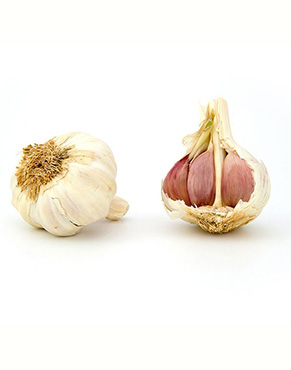How This Helps
Instructions
Science and Research
What gives garlic medicinal properties?
Garlic is a plant that comes from the Allium (onion) family. It’s closely associated with onions. Each section of a garlic bulb is known as clove. There are about 10-20 cloves in one bulb. Garlic grows in several parts of the world and is a popular ingredient in cooking because of the strong smell and delicious taste. But throughout history, the primary use of garlic has been for its medicinal and health properties. Its usage was well documented by several ancient cultures, such as the Egyptians, Greeks, and Chinese.
Scientists have uncovered that a large part of its health benefits results from sulfur compounds – the most important being allicin formed when a garlic clove is crushed or chopped. Allicin is an unstable substance that is only temporarily present in fresh garlic after it has been cut or chopped, Other chemicals that may play a part in garlic’s benefits include s-allyl cysteine and diallyl disulfide.
Garlic health benefits
The sulfur compounds from the garlic enter the body from the digestive tract and traveling all around the body, where it exerts its powerful biological effects.
1. Boost immunity: In test tubes, garlic seems to kill cancer cells, and studies involving individuals show some of the very same outcomes. According to a research study, between 41,000 middle-aged girls, those who ate garlic, fruits, and veggies had a 35 percent reduced colon cancer risk. Benefits came from raw and cooked garlic — not supplements. Garlic supplements are proven to increase the role of the immune system.
In another research study, the average duration of cold symptoms was also reduced by 70 percent to only 1.5 days in the garlic group, from 5 days in the placebo group.
2. Work as an anti-inflammatory: Research has proven that garlic oil functions as an anti-inflammatory. So, if you’ve got inflamed and sore joints or muscles, rub them with the oil.
3. Contains antioxidants: Oxidative damage is a significant factor in the aging procedure. Garlic contains antioxidants that aid the body’s mechanisms against oxidative damage. High doses of garlic in supplements form have been proven to improve antioxidant enzymes in humans, in addition, to significantly reduce oxidative stress in people who have high blood pressure ).
4. Improve cardiovascular health: The verdict is still out on whether garlic enhances your cholesterol levels, but research does indicate it may have a positive influence on your blood vessels and blood pressure. Human studies have found that garlic supplements have a significant impact on reducing blood pressure in people with hypertension.
In one study, 600-1,500 mg of garlic extract was equally as effective as the medication Atenolol in reducing blood pressure on a 24-week period. Researchers think red blood cells turn the sulfur in garlic to hydrogen sulfide gas, which expands our blood vessels, which makes it much easier to modulate blood pressure. The German Commission E recommends 4 g of garlic daily to lower your risk of cardiovascular disease.
5. May improve cholesterol levels: Garlic can lower total and LDL cholesterol. For those who have high cholesterol, garlic supplements seem to decrease total and/or LDL cholesterol by about 10–15 percent. Looking at LDL (or the “bad”) and HDL (or the”good”) cholesterol especially, garlic seems to reduce LDL but has no substantial effect on HDL.
6. Healthier skin & hair: Garlic’s antioxidants and antibacterial properties can clean your skin by killing acne-causing bacteria. Some data shows rubbing garlic over pimples can clean them off. Be aware, however, that it might cause a burning sensation in your skin.
7. Protect against bacteria: Those exact same antibacterial properties in garlic can kill the germs that result in food poisonings, such as salmonella and E.coli.
8. May Help You Live Longer: The possible effects of garlic on wellbeing are virtually impossible to show in humans. But given the beneficial impacts on significant risk factors like blood pressure, it is logical that garlic may help you live more. The fact it may combat infectious disease is also an essential factor since these are common causes of death, particularly in the elderly or people with dysfunctional immune systems.
9. Heavy metals detoxification in the body: Sulfur compounds in high dose garlic have been shown to protect against organ damage from heavy metal toxicity. A four-week study in personnel of a vehicle battery plant (excessive exposure to lead) discovered that garlic reduced lead levels in the bloodstream by 19%. Additionally, it reduced many clinical signs of toxicity, including headaches and blood pressure.
Garlic side effects
Garlic’s health benefits are many but do not add too much to your diet too quickly. Overdoing it can lead to distress, including bad breath, upset stomach, nausea, bloating, and body odor.
– You might also receive a stinging feeling on the skin should you manage substantial amounts of dried and fresh garlic. To prevent garlic-induced skin lesions, wear protective kitchen gloves.
– On rare occasions, garlic supplements may cause appetite loss, headaches, fatigue, muscle aches, dizziness, and allergic reactions such as asthma attacks or skin rashes.
– Should you choose blood thinners, choosing a garlic supplement may increase the medicine’s effect, which makes it even tougher for your blood to clot.
Summary
In addition to bringing a unique flavor to your diet, garlic can add many health benefits. Science has finally confirmed what was believed for centuries. Garlic possesses medicinal properties that can quickly become part of your diet.







